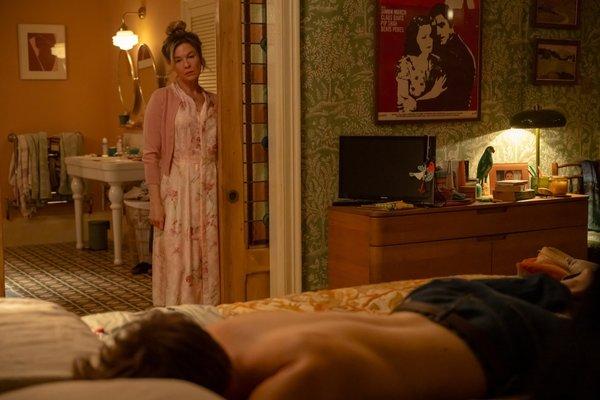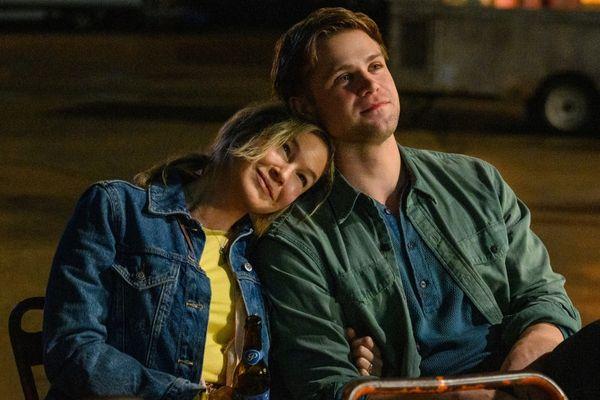It’s hard to believe it’s been almost a quarter of a century since we first encountered Renée Zellweger’s loveable Bridget Jones on the big screen.
For close to 25 years, we’ve collectively laughed, cried, and fallen in love with her as we’ve navigated the many chapters of her diary; from heartbreaks to awkward dates, love triangles, proposals, marriage, and babies. Now, Michael Morris helms the latest and arguably most emotional chapter of her diaries to date, in 'Bridget Jones: Mad About The Boy'.
In the latest chapter, now playing in cinemas, Bridget is now a single mother of two who is still reeling four years after the death of her husband, Mark Darcy (Colin Firth). With support from her friends including Hugh Grant’s Daniel Cleaver, Bridget decides to re-enter the workforce and the dating scene and finds herself romantically entangled with a much younger love interest (Leo Woodall) and her son’s teacher (Chiwetel Ejiofor). Among the hilarity and hijinks, Bridget learns to move through her grief and open herself up to new beginnings.
Delving into the world of one of the romantic comedy genre's most iconic characters didn’t come without its nerves; but Morris – whose previous credits include the Emmy-award winning series 'Brothers & Sisters' – focused his attention on the moments in the character’s life as opposed to the weight that comes with helming the latest iteration in a super successful franchise.

Image © Universal Pictures
“It’s an experience of a lifetime,” says Morris on directing 'Mad About The Boy'. “I’ve grown up with her and she’s been so important to me. What Renée, Hugh and Colin have brought to British romantic comedy is irreplaceable [but] I think the feeling of stepping in and getting into my own mind with 'oh you’re going to do the final chapter of Bridget Jones'. . . That would have been paralysing, so I kept my eyes on making this particular film and this moment and only later do I go, oh – she happens to be Bridget Jones.”
While 'Mad About The Boy' retains the charm and hilarity that one can expect from a 'Bridget Jones' film, the new iteration tackles some heavier themes. Morris was drawn to the project by the screenplay’s balance between grief and comedy. “She’s going through something when we meet her in the film and it’s so familiar to so many people. Grief as a general concept is not something we are accustomed to seeing in films and especially in comedies, and yet, life is a cocktail of comedy and sadness and joy and surprise, and the older we get the more our lives incorporate the sweet and the sour. I felt it was a lovely time in her life to investigate that.”
“She’s still got a massive future ahead of her. She’s got two young children and she’s going to launch herself again into the world, but she’s also got a massive past now. She’s got the experience of love and a massive love and loss, so it’s like this era of, say, 50ish, where it’s very delicately poised. Do you go back to work? Do you start again? Do you date? All of these questions are very active.”
Morris credits his experiences on 'Brothers & Sisters' with Sally Field, Calista Flockhart and Australian star Rachel Griffiths as helping him find that balance between comedy and grief in these smaller moments. “It was something that Sally Field, who was so brilliant in 'Brothers & Sisters', said. There was a scene that was angled one way and she was coming at it another way and I heard her say to the person directing that episode, 'I never approach a scene with any expectation – the world might think I might cry on this line, but I might not. I don't know until I do the scene', and I found this so instructive. I’ve never let it go.”
“What we are all in search of is an authentic moment, and moments never cease to surprise me. I’ve gone through moments of great tragedy in my life, and I’ve spent them laughing because that’s how my brain was processing it. Sometimes on a page you can think 'oh, you have to cry'. . . But the difference of how we think we are going to act and how we act makes it more of an authentic moment to the people watching.”
“It’s about leaving space in the film. You leave them the space to find these moments; so much of filmmaking is moments. It’s not always about what you say. Sometimes it’s just the look that you give, or the thing that you’re catching, that's valuable.”

Image © Universal Pictures
Few romantic comedies have spawned a franchise like 'Bridget Jones', and the character has very much become synonymous with the romantic comedy genre, which Morris credits is thanks to its star Zellweger.
“Renée is exceptional. She’s capable of great drama and we know this from her Oscar-winning roles that she’s done. Just watch her playing Judy [Garland] a few years ago, and you can see the scale and size she’s capable of, but she’s also one of the greatest physical comedians. It’s the combo of that that means she’s always alive on film.
“She’s always making choices and most often in 'Bridget', her choices are our choices. They’re not slick, she’s not saying the right thing in the right moments. She’s probably going to slip off her chair, off the platform, but she’ll get back on to it again – she’ll sit in it and she’ll smile and that’s what we love about Bridget. It’s the chaos that all of us sit with. We all have a certain level of Bridget’s chaos.”
Morris hopes audiences will learn a thing or two from Bridget’s ability to pick herself back up: “I want people to hold Bridget’s hand and walk through this journey that she’s in before they take any messages. The messages can be different to anybody to watch someone like Bridget learn to open up again. . . But if there’s anything I want them to take away from this, it's that we only gain from our lives if we do go out, if we do open up our doors, if we do climb trees and if we do go to the lake district – and that’s how we can survive.”
'Bridget Jones: Mad About The Boy' is in cinemas now.

